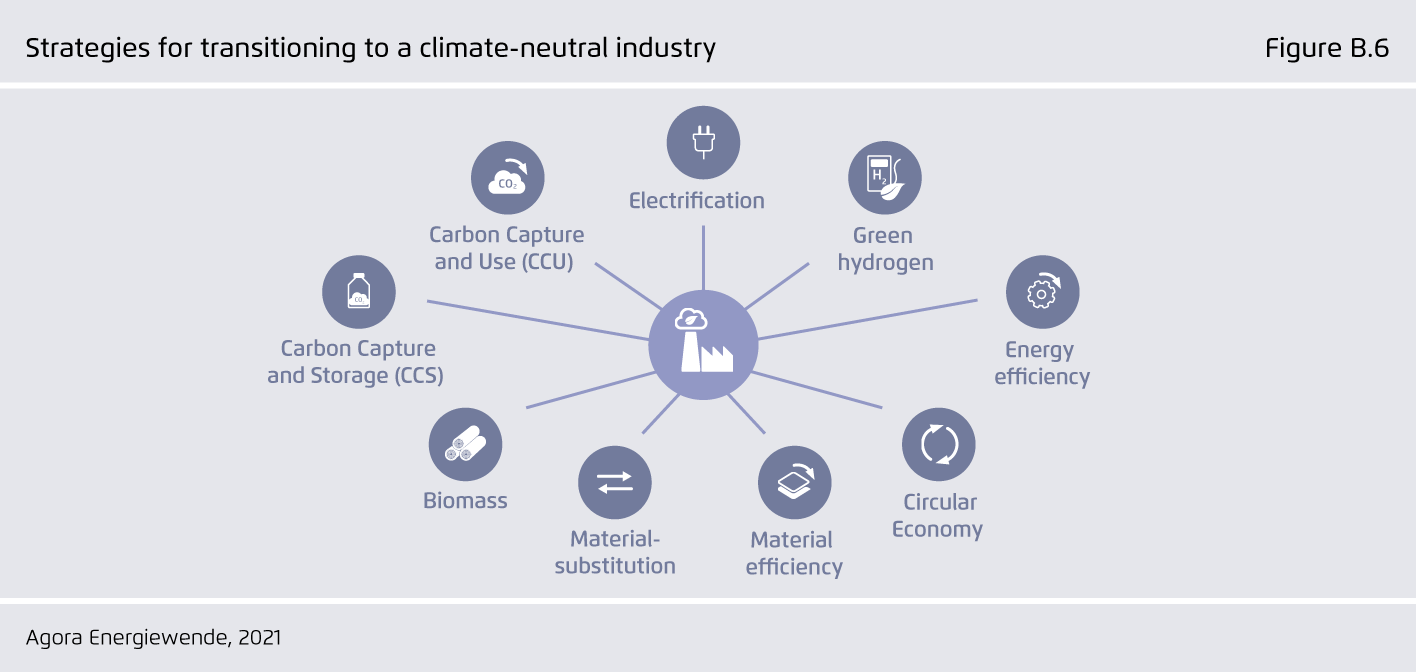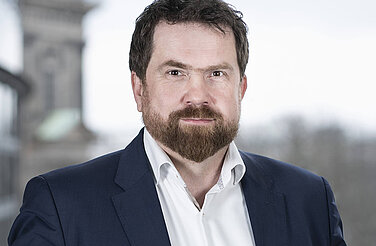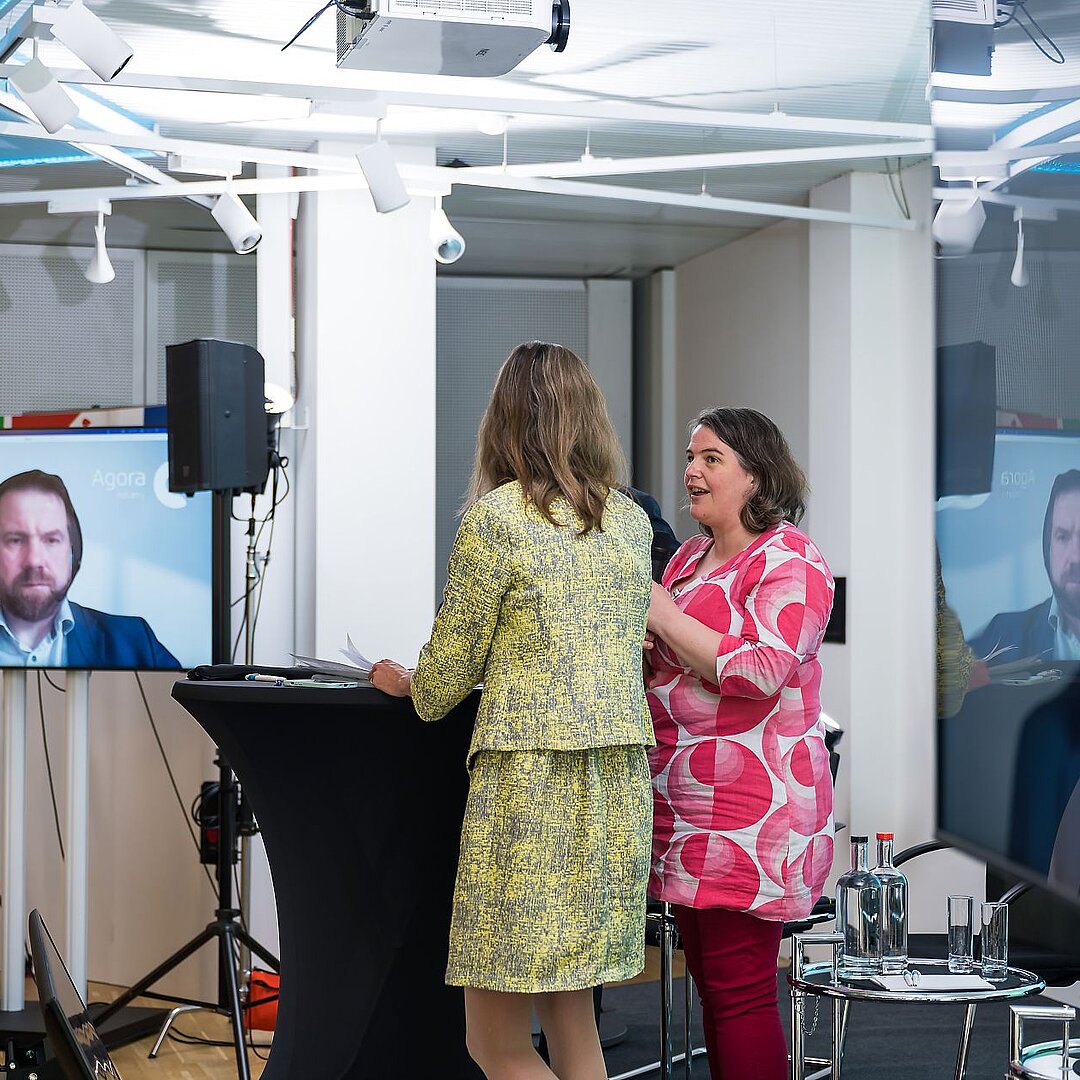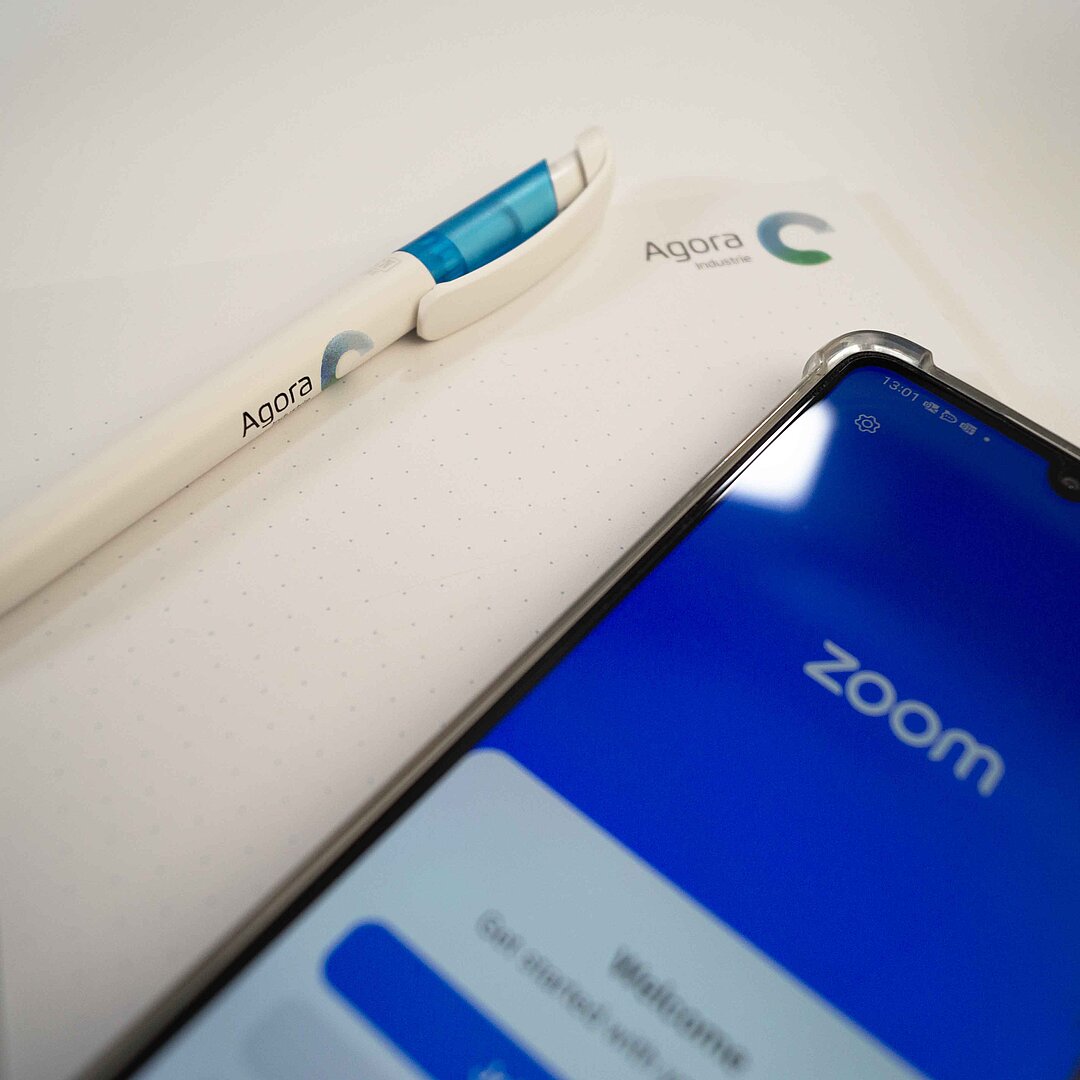-
Given the new paradigm of achieving climate neutrality by 2050, current climate and industry
policies will lead to investment leakage or risk stranded industrial assets.
Industrial companies understand: The EU objective of climate neutrality by 2050 has clear implications for industrial reinvestment in the 2020s. Carbon-intensive technologies have lifetimes of up to 70 years. Reinvestments into long-lived assets will not be made unless there is an investment framework to deploy climate-neutral technologies.
-
With a new policy framework, the basic materials industries can support an increased EU
2030 climate target of at least -55 per cent. Key low-carbon technologies are available and
can be deployed well before 2030.
The CO2 abatement potential of key low-carbon technologies in the steel, chemicals, and cement sectors alone amounts to 145 Mt of CO2 by 2030, exceeding the required emission reductions from industry under the EU ETS. Their deployment will represent a breakthrough in Europe’s industrial sector and ensure it a leading global role.
-
By 2030, 30 to 50 per cent of existing assets in cement, steel, and chemicals will require major reinvestment. New policies are needed now to create a business case for breakthrough technologies.
Key low-carbon technologies are available, but their abatement costs are still in the range of 100 to 170 €/t of CO2. The EU should adopt policy instruments to cover the gap between these abatement costs and the EU ETS price as soon as possible.
-
Europe needs a Clean Industry Package in 2021 to kick-start breakthrough investments and protect existing assets.
By refining existing carbon leakage protection instruments it will be possible to protect existing plants until they can be replaced. At the same time, decisive support for investments in breakthrough technologies is needed. This should come in the form of carbon contracts-for-difference, planning and financing for clean-energy installations and infrastructure, and standards to create markets for climate-neutral and circular products.
- Format
- Study
- Date
- 21 April 2021
Breakthrough strategies for climate-neutral industry in Europe (study)
Policy and Technology Pathways for Raising EU Climate Ambition

Preface
The basic materials industries are a cornerstone of Europe’s economic prosperity, increasing gross value added and providing around 2 million high-quality jobs. But they are also a major source of greenhouse gas emissions. Despite efficiency improvements, emissions from these industries were mostly constant for several years prior to the Covid-19 crisis and today account for 20 per cent of the EU’s total greenhouse gas emissions.
A central question is therefore: How can the basic material industries in the EU become climate-neutral by 2050 while maintaining a strong position in a highly competitive global market? And how can these industries help the EU reach the higher 2030 climate target – a reduction of greenhouse gas emissions of at least 55 per cent relative to 1990 levels?
In the EU policy debate on the European Green Deal, many suppose that the basic materials industries can do little to achieve deep cuts in emissions by 2030. Beyond improvements to the efficiency of existing technologies, they assume that no further innovations will be feasible within that period. This study takes a different view. It shows that a more ambitious approach involving the early implementation of key low-carbon technologies and a Clean Industry Package is not just possible, but in fact necessary to safeguard global competitiveness.
Key findings
Bibliographical data
- Authors
- Wido K. Witecka, Dr. Oliver Sartor, Philipp D. Hauser, Dr. Camilla Oliveira, Dr. Fabian Joas, Thorsten Lenck, Frank Peter, Fiona Seiler (all Agora Energiewende), Clemens Schneider, Dr. Georg Holtz, Dr. Sascha Samadi, Dr. Georg Kobiela, Prof. Dr. Stefan Lechtenböhmer (all Wuppertal Institute), Katja Dinges, Dr. Karoline Steinbacher, Jonas Schröder, Thobias Sach, Matthias Schimmel (all Guidehouse), Christine Kliem LL.M., Dr. Martin Altrock, Dr. Wieland Lehnert LL.M., Dr. Jasper Finke (all BBH), Yasin Yilmaz (IKEM)
- Publication number
- 208/02-S-2021/EN
- Version number
- 1.0
- Publication date
-
21 April 2021
- Pages
- 216
- Suggested Citation
- Agora Energiewende and Wuppertal Institute (2021): Breakthrough Strategies for Climate-Neutral Industry in Europe: Policy and Technology Pathways for Raising EU Climate Ambition.
- Project
- This publication was produced within the framework of the project A Clean Industry Package for Europe.
Downloads
-
pdf 20 MB
Breakthrough Strategies for Climate-Neutral Industry in Europe (Study)
Policy and Technology Pathways for Raising EU Climate Ambition
All figures in this publication
Greenhouse gas emissions of the EU27 industrial sector in 2017 in MtCO₂eq
Figure A.1 from Breakthrough strategies for climate-neutral industry in Europe (study) on page 34

Under consideration of the Creative Commons license CC BY (attribution) the image may be further processed in any format or medium (also commercially, also in modified form), as long as the author is mentioned and a link to the license is given.
CO₂ emitted by the EU27 industrial sector from 1990 to 2018 and proposed sector targets for 2030 and 2050
Figure A.2 from Breakthrough strategies for climate-neutral industry in Europe (study) on page 36

Under consideration of the Creative Commons license CC BY (attribution) the image may be further processed in any format or medium (also commercially, also in modified form), as long as the author is mentioned and a link to the license is given.
Historical EU27 CO emissions from all industrial sources broken down by type
Figure A.3 from Breakthrough strategies for climate-neutral industry in Europe (study) on page 37

Under consideration of the Creative Commons license CC BY (attribution) the image may be further processed in any format or medium (also commercially, also in modified form), as long as the author is mentioned and a link to the license is given.
Reinvestment needs by 2030 and direct employment in cement, steel and basic chemicals in the EU
Figure B.1 from Breakthrough strategies for climate-neutral industry in Europe (study) on page 40

Under consideration of the Creative Commons license CC BY (attribution) the image may be further processed in any format or medium (also commercially, also in modified form), as long as the author is mentioned and a link to the license is given.
Technical lifetime of selected primary production plants in the steel, chemical, and cement sectors scheduled to receive reinvestment in 2025
Figure B.2 from Breakthrough strategies for climate-neutral industry in Europe (study) on page 40

Under consideration of the Creative Commons license CC BY (attribution) the image may be further processed in any format or medium (also commercially, also in modified form), as long as the author is mentioned and a link to the license is given.
Two scenarios for new investment in the 2020s and their implications for climate change, the economy, and employment in the EU
Figure B.3 from Breakthrough strategies for climate-neutral industry in Europe (study) on page 41

Under consideration of the Creative Commons license CC BY (attribution) the image may be further processed in any format or medium (also commercially, also in modified form), as long as the author is mentioned and a link to the license is given.
Estimated CO abatement costs of selected key low-carbon technologies versus today‘s conventional reference process for 2030
Figure B.4 from Breakthrough strategies for climate-neutral industry in Europe (study) on page 47

Under consideration of the Creative Commons license CC BY (attribution) the image may be further processed in any format or medium (also commercially, also in modified form), as long as the author is mentioned and a link to the license is given.
Wind and solar growth must almost triple to reach EU climate target
Figure B.5 from Breakthrough strategies for climate-neutral industry in Europe (study) on page 48

Under consideration of the Creative Commons license CC BY (attribution) the image may be further processed in any format or medium (also commercially, also in modified form), as long as the author is mentioned and a link to the license is given.
Strategies for transitioning to a climate-neutral industry
Figure B.6 from Breakthrough strategies for climate-neutral industry in Europe (study) on page 51

Under consideration of the Creative Commons license CC BY (attribution) the image may be further processed in any format or medium (also commercially, also in modified form), as long as the author is mentioned and a link to the license is given.
Estimated industrial hydrogen demand for the EU steel and chemicals industry
Figure B.7 from Breakthrough strategies for climate-neutral industry in Europe (study) on page 52

Under consideration of the Creative Commons license CC BY (attribution) the image may be further processed in any format or medium (also commercially, also in modified form), as long as the author is mentioned and a link to the license is given.
Comparison of the primary steel route with direct reduction using green hydrogen and the secondary steel route (electric-arc route) for 2050
Figure B.8 from Breakthrough strategies for climate-neutral industry in Europe (study) on page 57

Under consideration of the Creative Commons license CC BY (attribution) the image may be further processed in any format or medium (also commercially, also in modified form), as long as the author is mentioned and a link to the license is given.
Reinvestment needs by 2030 and direct employment in cement, steel and basic chemicals in the EU
Figure B.9 from Breakthrough strategies for climate-neutral industry in Europe (study) on page 66

Under consideration of the Creative Commons license CC BY (attribution) the image may be further processed in any format or medium (also commercially, also in modified form), as long as the author is mentioned and a link to the license is given.
Development of the carbon price in the EU Emissions Trading System from 2009 to 2021
Figure C.1 from Breakthrough strategies for climate-neutral industry in Europe (study) on page 81

Under consideration of the Creative Commons license CC BY (attribution) the image may be further processed in any format or medium (also commercially, also in modified form), as long as the author is mentioned and a link to the license is given.
Operation of the EU Innovation Fund
Figure C.2 from Breakthrough strategies for climate-neutral industry in Europe (study) on page 82

Under consideration of the Creative Commons license CC BY (attribution) the image may be further processed in any format or medium (also commercially, also in modified form), as long as the author is mentioned and a link to the license is given.
Process for the selection of policy instruments
Figure C.3 from Breakthrough strategies for climate-neutral industry in Europe (study) on page 84

Under consideration of the Creative Commons license CC BY (attribution) the image may be further processed in any format or medium (also commercially, also in modified form), as long as the author is mentioned and a link to the license is given.
A shortlist of ten policy instruments
Figure C.4 from Breakthrough strategies for climate-neutral industry in Europe (study) on page 88

Under consideration of the Creative Commons license CC BY (attribution) the image may be further processed in any format or medium (also commercially, also in modified form), as long as the author is mentioned and a link to the license is given.
Approaches for the policy instruments in the shortlist
Figure C.5 from Breakthrough strategies for climate-neutral industry in Europe (study) on page 89

Under consideration of the Creative Commons license CC BY (attribution) the image may be further processed in any format or medium (also commercially, also in modified form), as long as the author is mentioned and a link to the license is given.
Mechanism of the carbon price floor with border carbon adjustment
Figure C.6 from Breakthrough strategies for climate-neutral industry in Europe (study) on page 92

Under consideration of the Creative Commons license CC BY (attribution) the image may be further processed in any format or medium (also commercially, also in modified form), as long as the author is mentioned and a link to the license is given.
Carbon Contracts-for-Difference
Figure C.7 from Breakthrough strategies for climate-neutral industry in Europe (study) on page 96

Under consideration of the Creative Commons license CC BY (attribution) the image may be further processed in any format or medium (also commercially, also in modified form), as long as the author is mentioned and a link to the license is given.
Mechanism of green financing instruments
Figure C.8 from Breakthrough strategies for climate-neutral industry in Europe (study) on page 100

Under consideration of the Creative Commons license CC BY (attribution) the image may be further processed in any format or medium (also commercially, also in modified form), as long as the author is mentioned and a link to the license is given.
How a climate surcharge on end products would affect steel processing in the automotive industry – an example
Figure C.9 from Breakthrough strategies for climate-neutral industry in Europe (study) on page 104

Under consideration of the Creative Commons license CC BY (attribution) the image may be further processed in any format or medium (also commercially, also in modified form), as long as the author is mentioned and a link to the license is given.
How the carbon price on end products would affect steel processing in the automotive industry – an example
Figure C.10 from Breakthrough strategies for climate-neutral industry in Europe (study) on page 108

Under consideration of the Creative Commons license CC BY (attribution) the image may be further processed in any format or medium (also commercially, also in modified form), as long as the author is mentioned and a link to the license is given.
Effect of green public procurement
Figure C.11 from Breakthrough strategies for climate-neutral industry in Europe (study) on page 112

Under consideration of the Creative Commons license CC BY (attribution) the image may be further processed in any format or medium (also commercially, also in modified form), as long as the author is mentioned and a link to the license is given.
How a quota for low-carbon materials affects steel processing in the automotive industry – an example
Figure C.12 from Breakthrough strategies for climate-neutral industry in Europe (study) on page 116

Under consideration of the Creative Commons license CC BY (attribution) the image may be further processed in any format or medium (also commercially, also in modified form), as long as the author is mentioned and a link to the license is given.
Clean Hydrogen Support Policies
Figure C.13 from Breakthrough strategies for climate-neutral industry in Europe (study) on page 120

Under consideration of the Creative Commons license CC BY (attribution) the image may be further processed in any format or medium (also commercially, also in modified form), as long as the author is mentioned and a link to the license is given.
Effect of changes to construction and product standards
Figure C.14 from Breakthrough strategies for climate-neutral industry in Europe (study) on page 124

Under consideration of the Creative Commons license CC BY (attribution) the image may be further processed in any format or medium (also commercially, also in modified form), as long as the author is mentioned and a link to the license is given.
The effect of standards for recyclable products
Figure C.15 from Breakthrough strategies for climate-neutral industry in Europe (study) on page 128

Under consideration of the Creative Commons license CC BY (attribution) the image may be further processed in any format or medium (also commercially, also in modified form), as long as the author is mentioned and a link to the license is given.
CO₂ emitted by the EU27 industrial sector from 1990 to 2018 and proposed sector targets for 2030 and 2050
Figure D.1 from Breakthrough strategies for climate-neutral industry in Europe (study) on page 135

Under consideration of the Creative Commons license CC BY (attribution) the image may be further processed in any format or medium (also commercially, also in modified form), as long as the author is mentioned and a link to the license is given.
Reinvestment needs by 2030 and direct employment in cement, steel and basic chemicals in the EU
Figure D.2 from Breakthrough strategies for climate-neutral industry in Europe (study) on page 136

Under consideration of the Creative Commons license CC BY (attribution) the image may be further processed in any format or medium (also commercially, also in modified form), as long as the author is mentioned and a link to the license is given.
Expected emissions reductions from EU ETS industry under a -55% 2030 EU climate target.and decarbonisation levers to deliver those reductions
Figure D.3 from Breakthrough strategies for climate-neutral industry in Europe (study) on page 137

Under consideration of the Creative Commons license CC BY (attribution) the image may be further processed in any format or medium (also commercially, also in modified form), as long as the author is mentioned and a link to the license is given.
Estimated CO 2 abatement costs of selected key technologies versus today‘s conventional reference process for 2030
Figure D.4 from Breakthrough strategies for climate-neutral industry in Europe (study) on page 138

Under consideration of the Creative Commons license CC BY (attribution) the image may be further processed in any format or medium (also commercially, also in modified form), as long as the author is mentioned and a link to the license is given.
Policy needs at the di erent parts of the value chain
Figure D.5 from Breakthrough strategies for climate-neutral industry in Europe (study) on page 140

Under consideration of the Creative Commons license CC BY (attribution) the image may be further processed in any format or medium (also commercially, also in modified form), as long as the author is mentioned and a link to the license is given.
Policy options to support investments into clean hydrogen
Figure D.6 from Breakthrough strategies for climate-neutral industry in Europe (study) on page 142

Under consideration of the Creative Commons license CC BY (attribution) the image may be further processed in any format or medium (also commercially, also in modified form), as long as the author is mentioned and a link to the license is given.
The CCfD mechanism with two anti-leakage policies (free allocation vs BCAs)
Figure D.7 from Breakthrough strategies for climate-neutral industry in Europe (study) on page 143

Under consideration of the Creative Commons license CC BY (attribution) the image may be further processed in any format or medium (also commercially, also in modified form), as long as the author is mentioned and a link to the license is given.
Cost estimate for financing CCfDs of a hypothetical member state representing ~10% of the EU’s primary steel or cement production
Figure D.8 from Breakthrough strategies for climate-neutral industry in Europe (study) on page 145

Under consideration of the Creative Commons license CC BY (attribution) the image may be further processed in any format or medium (also commercially, also in modified form), as long as the author is mentioned and a link to the license is given.
Short, medium and long-term policy tools for carbon leakage protection
Figure D.9 from Breakthrough strategies for climate-neutral industry in Europe (study) on page 148

Under consideration of the Creative Commons license CC BY (attribution) the image may be further processed in any format or medium (also commercially, also in modified form), as long as the author is mentioned and a link to the license is given.
Free allocation and the EU ETS emissions cap with an EU-wide -55% in 2030 and climate neutrality in 2050 target
Figure D.10 from Breakthrough strategies for climate-neutral industry in Europe (study) on page 150

Under consideration of the Creative Commons license CC BY (attribution) the image may be further processed in any format or medium (also commercially, also in modified form), as long as the author is mentioned and a link to the license is given.
Free allocation and the EU ETS emissions cap assuming ETS extension to buildings and transport
Figure D.11 from Breakthrough strategies for climate-neutral industry in Europe (study) on page 151

Under consideration of the Creative Commons license CC BY (attribution) the image may be further processed in any format or medium (also commercially, also in modified form), as long as the author is mentioned and a link to the license is given.
How the cost of carbon in upstream basic materials translates into price increases in downstream products
Figure D.12 from Breakthrough strategies for climate-neutral industry in Europe (study) on page 153

Under consideration of the Creative Commons license CC BY (attribution) the image may be further processed in any format or medium (also commercially, also in modified form), as long as the author is mentioned and a link to the license is given.
Policies and legislative instruments to implement the Clean Industry Package
Figure D.13 from Breakthrough strategies for climate-neutral industry in Europe (study) on page 157

Under consideration of the Creative Commons license CC BY (attribution) the image may be further processed in any format or medium (also commercially, also in modified form), as long as the author is mentioned and a link to the license is given.
Process steps and carbon emissions of crude steel production (integrated blast-furnace route)
Figure E.1 from Breakthrough strategies for climate-neutral industry in Europe (study) on page 165

Under consideration of the Creative Commons license CC BY (attribution) the image may be further processed in any format or medium (also commercially, also in modified form), as long as the author is mentioned and a link to the license is given.
Process steps and CO₂ emissions from ammonia synthesis as part of the fertiliser value chain
Figure E.2 from Breakthrough strategies for climate-neutral industry in Europe (study) on page 177

Under consideration of the Creative Commons license CC BY (attribution) the image may be further processed in any format or medium (also commercially, also in modified form), as long as the author is mentioned and a link to the license is given.
Process steps and CO₂ emissions in the plastics/synthetics value chain
Figure E.3 from Breakthrough strategies for climate-neutral industry in Europe (study) on page 178

Under consideration of the Creative Commons license CC BY (attribution) the image may be further processed in any format or medium (also commercially, also in modified form), as long as the author is mentioned and a link to the license is given.
Process steps for the MTO/MTA route
Figure E.4 from Breakthrough strategies for climate-neutral industry in Europe (study) on page 179

Under consideration of the Creative Commons license CC BY (attribution) the image may be further processed in any format or medium (also commercially, also in modified form), as long as the author is mentioned and a link to the license is given.
Process steps and direct CO₂ emissions from cement production
Figure E.5 from Breakthrough strategies for climate-neutral industry in Europe (study) on page 197

Under consideration of the Creative Commons license CC BY (attribution) the image may be further processed in any format or medium (also commercially, also in modified form), as long as the author is mentioned and a link to the license is given.
CO₂ emitted by the EU27 industrial sector from 1990 to 2018 and proposed sector targets for 2030 and 2050
Figure ES.1 from Breakthrough strategies for climate-neutral industry in Europe (study) on page 13

Under consideration of the Creative Commons license CC BY (attribution) the image may be further processed in any format or medium (also commercially, also in modified form), as long as the author is mentioned and a link to the license is given.
Overview of possible key technologies for nearly carbon-neutral basic materials industries
Figure ES.2 from Breakthrough strategies for climate-neutral industry in Europe (study) on page 15

Under consideration of the Creative Commons license CC BY (attribution) the image may be further processed in any format or medium (also commercially, also in modified form), as long as the author is mentioned and a link to the license is given.
Reinvestment needs by 2030 and direct employment in cement, steel and basic chemicals in the EU
Figure ES.3 from Breakthrough strategies for climate-neutral industry in Europe (study) on page 16

Under consideration of the Creative Commons license CC BY (attribution) the image may be further processed in any format or medium (also commercially, also in modified form), as long as the author is mentioned and a link to the license is given.
Technical lifetime of selected primary production plants in the steel, chemical, and cement sectors scheduled to receive reinvestment in 2025
Figure ES.4 from Breakthrough strategies for climate-neutral industry in Europe (study) on page 17

Under consideration of the Creative Commons license CC BY (attribution) the image may be further processed in any format or medium (also commercially, also in modified form), as long as the author is mentioned and a link to the license is given.
Two scenarios for new investment in the 2020s and their implications for climate change, the economy, and employment in the EU
Figure ES.5 from Breakthrough strategies for climate-neutral industry in Europe (study) on page 19

Under consideration of the Creative Commons license CC BY (attribution) the image may be further processed in any format or medium (also commercially, also in modified form), as long as the author is mentioned and a link to the license is given.
Expected emissions reductions from EU ETS industry for the EU's 2030 -55% climate target, along with decarbonisation levers to deliver those reductions
Figure ES.6 from Breakthrough strategies for climate-neutral industry in Europe (study) on page 20

Under consideration of the Creative Commons license CC BY (attribution) the image may be further processed in any format or medium (also commercially, also in modified form), as long as the author is mentioned and a link to the license is given.
CO₂ abatement potential of selected key low-carbon technologies in the steel, chemical, and cement sectors by 2030
Figure ES.7 from Breakthrough strategies for climate-neutral industry in Europe (study) on page 21

Under consideration of the Creative Commons license CC BY (attribution) the image may be further processed in any format or medium (also commercially, also in modified form), as long as the author is mentioned and a link to the license is given.
Estimated CO₂ abatement costs of selected key low-carbon technologies versus today‘s conventional reference process for 2030
Figure ES.8 from Breakthrough strategies for climate-neutral industry in Europe (study) on page 26

Under consideration of the Creative Commons license CC BY (attribution) the image may be further processed in any format or medium (also commercially, also in modified form), as long as the author is mentioned and a link to the license is given.
Policy needs in the value chain
Figure ES.9 from Breakthrough strategies for climate-neutral industry in Europe (study) on page 28

Under consideration of the Creative Commons license CC BY (attribution) the image may be further processed in any format or medium (also commercially, also in modified form), as long as the author is mentioned and a link to the license is given.
Short-, medium-, and long-term policy tools for carbon leakage protection
Figure ES.10 from Breakthrough strategies for climate-neutral industry in Europe (study) on page 30

Under consideration of the Creative Commons license CC BY (attribution) the image may be further processed in any format or medium (also commercially, also in modified form), as long as the author is mentioned and a link to the license is given.
Policies and legislative instruments to implement the Clean Industry Package
Figure ES.11 from Breakthrough strategies for climate-neutral industry in Europe (study) on page 32

Under consideration of the Creative Commons license CC BY (attribution) the image may be further processed in any format or medium (also commercially, also in modified form), as long as the author is mentioned and a link to the license is given.
Our experts
-

Wido K. Witecka
Project Manager Industry (until June 2024)






